hairball support
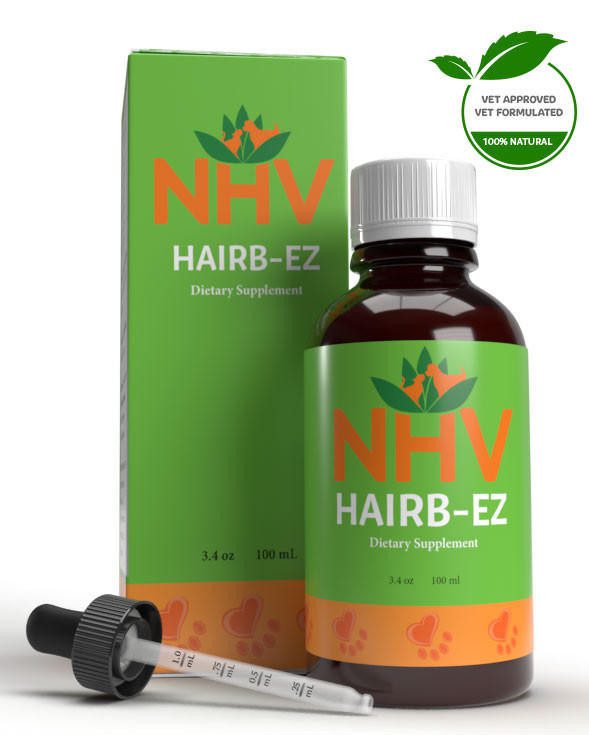
free shipping over $100 (USA & Canada)
1-877-937-4372 the pet expert hotline
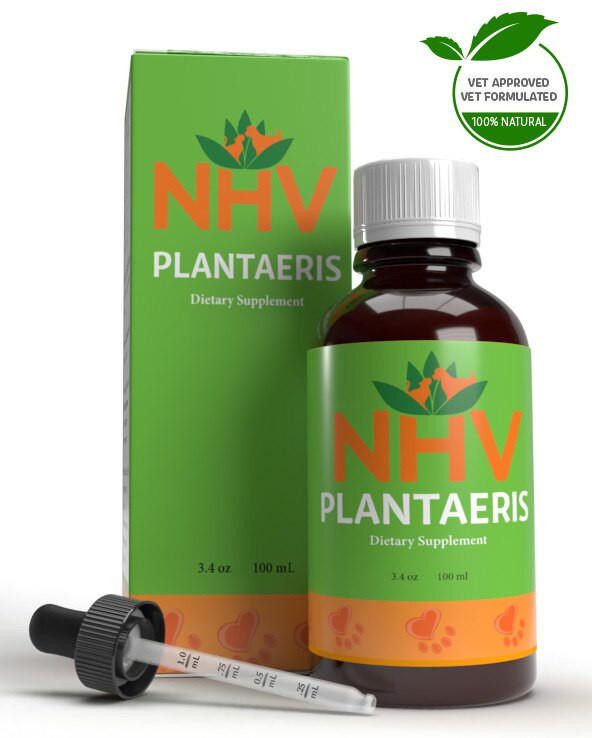
Natural Relief for Diarrhea and Inflammatory Bowel Disease (IBD)

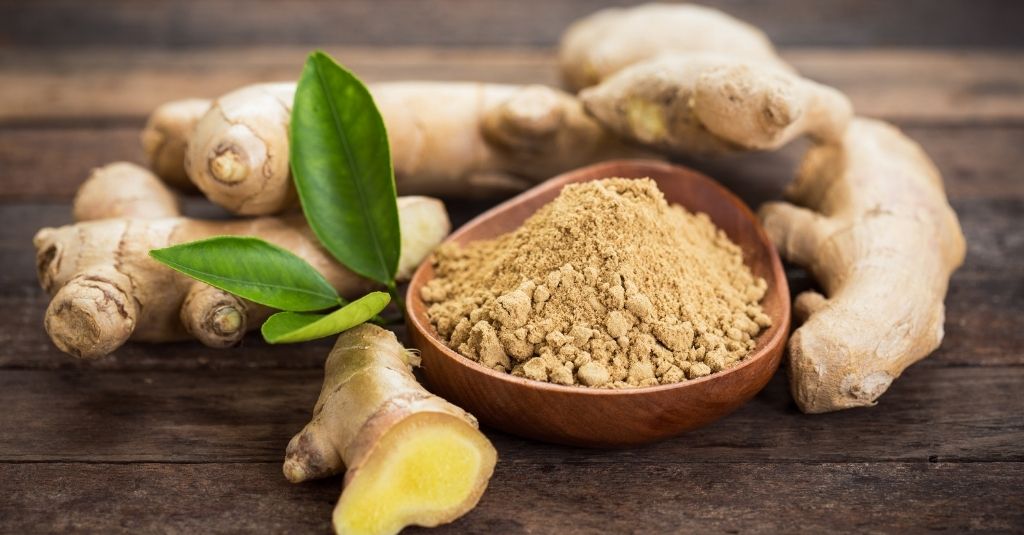
Ginger is a common herb all over the world. It is a popular ingredient in cooking across the globe for its spice and flavor. It is also popularly used as a herbal remedy for various issues. Since this ingredient is a staple in most homes, you may be wondering, “is ginger good for dogs and cats?” Keep reading to find out!
There are multiple types of ginger, but the most popular one is called Zingiber officinale. This is the type we will be discussing throughout this blog.
Ginger is a perennial plant with long, narrow leaves and stalks that grow up to 2 feet tall. It grows well in tropical climates with fertile soil and plenty of rain. Ginger plants also produce white or yellow flowers. The rhizome is the part of the plant that we commonly recognize as ginger. While you may see ginger labeled as “ginger root” at the grocery store, it is the rhizome and not the root. Rhizomes are stems that grow horizontally under the ground, and the roots and shoots are smaller and grow from the rhizomes. The rhizomes contain high levels of active ingredients that contribute to ginger’s flavor and medicinal properties, which is why you don’t often see other parts of the plant being used. Ginger is closely related to turmeric, another plant that is popularly used for the medicinal properties found in the rhizome.

Ginger has been used throughout history in Asia and Europe. Ginger is a well-researched herb since it has been a staple in cooking and medicine for centuries. Traditionally, ginger has been predominantly used to aid humans’ digestive and circulatory systems.
Ginger can be especially useful for the gastrointestinal, circulatory, and respiratory systems.
Ginger is commonly used for nausea, but it is helpful for many other health concerns. Ginger is known to have the following properties:
Due to these properties, ginger can be especially useful for the gastrointestinal, circulatory, and respiratory systems. Ginger can be used for issues like indigestion, gas, colic, gastrointestinal infections, nausea, constipation, and diarrhea for gastrointestinal health. Ginger is also used for aiding circulation due to its stimulating properties. You may find ginger used for its respiratory support since it can help loosen phlegm in the lungs, helps fight infections, and helps reduce coughing.
The benefits of ginger come from the active ingredients; zingiberene, gingerol, and shogaols. Zingiberene is the active ingredient with the highest concentration in ginger and is credited for giving ginger its flavor and many of its medicinal properties.

When used at the right dosage for their size, ginger is safe for supporting most pets. Ginger should not be given to pets who are pregnant or are lactating. In excessive doses, ginger can interfere with other therapies and medications. That’s why it is important to use ginger only at a dosage confirmed by a holistic veterinarian.
At NHV, all of our supplements are formulated by a veterinarian and master herbalist to ensure that they are safe for your pet. The dosage is calculated to not interfere with other medications and therapies and be safely increased for pets needing extra support. We recommend administering all NHV supplements 2 hours (or at least 30 minutes) before or after other medications or supplements to ensure that all of your pet’s support has time to be properly absorbed.
We use ginger in six of our herbal supplement blends for a variety of its benefits:
Alge-Ex is our supplement for pets with environmental allergies and can help with symptoms like sneezing, itchy eyes and face, and irritated skin. Ginger is included in this formula to support the respiratory system.
Hairb-Ez is a great addition for pets prone to hairballs. It contains herbs like ginger that promote gastrointestinal health to help hairballs safely move through the GI tract.
Maris is formulated specifically to help ease constipation in our furry friends. Ginger and other herbs in the blend support healthy gastrointestinal function, help ease inflammation in the digestive tract, and encourage softer stools.
Old Timer is great support for pets with arthritis and muscle and joint issues. Ginger is included in the formula to help with inflammation and discomfort in the joints.
Plantaeris is for helping pets with diarrhea. The blend of herbs helps ease the spasms in the digestive tract that cause diarrhea and promote the overall health of the gastrointestinal tract.
Resp-Aid utilizes ginger for its respiratory benefits. Resp-Aid is our main supplement to help with disorders like asthma, collapsed trachea, and respiratory infections. Ginger contributes to this formula to help reduce coughing, help with congestion, and fight infections.
If you have any questions about using ginger for your pet, get in touch with our pet experts! We’re here to help answer your pet health questions and guide you on naturally supporting your little one. Click the button below to get started.
hairball support

Cat Hairball Remedy
buy 2 and save $3
3 month supply for a small to medium size pet.
Hairb-Ez is a natural cat hairball remedy that helps your cat to pass indigestible hair from its system and reduces regurgitated hair. It also

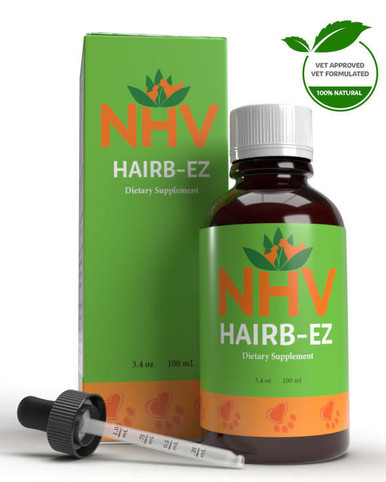
Hairb-Ez is a natural cat hairball remedy that helps your cat to pass indigestible hair from its system and reduces regurgitated hair. It also

Help eliminate nasty hairballs and resulting constipation with Hairb-Ez, an all-natural herbal cat hairball remedy that helps unblock loose hair and keep it from forming into balls that become lodged in your cat’s stomach. Hairballs result from frequent grooming with the tongue and are common in long and medium-haired cats.
Hairb-Ez helps to dissolve ingested hairballs. It contains a gentle laxative herb as well as herbs that help relieve discomfort and bloating. Read how NHV Hairb-Ez helped Tatiana the kitty who had terrible bouts of hairballs until NHV Hairb-Ez.
This formula can also be used for dogs who may get hairballs, though this is a much rarer condition in dogs, and underlying causes should be looked at by your vet. For more tips on hairballs, visit Dr. Cook’s Vet Talks blog.
Licorice – Has mild laxative properties that support proper digestion. It is also a powerful anti-inflammatory herb that also has the ability to prevent free radical damage. It is also beneficial for the liver.
Cascara Sagrada – The cascarosides found in this bark have a cathartic action that causes the large intestine to contract and form a bowel movement. Cascara sagrada is widely used in veterinary medicine to help with constipation.
Oregon Grape – Improves digestive efficiency by increasing bile production and flow, which stimulates the liver. Oregon grape also helps against microorganisms that help combat fungal and bacterial infections.
Ginger – Helps cleanse the bowels and kidneys and stimulates digestion. It is also helpful against discomfort and helps expel internal gas, and aids in reducing nausea.
Raspberry – The tannins in raspberry help control and balance the laxative effects of HairB-Ez. Raspberry leaf also has astringent, anti-inflammatory properties and is rich in vitamin C.
Lobelia – Contains mucous-thinning properties that help relieve bowel spasms.
Chinese Rhubarb – Strengthens the gastrointestinal tract.
Select your pet's weight to determine the correct dose.
To be taken twice daily. Determine your pet’s weight and then use the easy chart below to determine the correct dose. This is the minimum dosage.
Pet's Weight Dosage
0 - 15 lb = 0.5 ml
16 - 30 lb = 1.0 ml
31 - 45 lb = 1.5 ml
46 - 60 lb = 2.0 ml
61 - 75 lb = 2.5 ml
Over 75 lb = 3.0 ml
For small animals (rabbits, ferrets), avians and reptiles use 1 drop for every 2 lb of body weight.
How to Administer
Shake well before use. The easiest method is to use the dropper provided and place the drops into your pet’s food or favorite treat. You can also use the dropper and squirt directly into the pet’s mouth. Some pets can be finicky. If this occurs, consider hiding the drops in foods most pets love, such as fish, chicken, yogurt, or a favorite treat. If your pet only eats dry food, then soak a few kibbles at feeding time.
For Best Results
Herbal dietary supplements are beneficial to the health and well-being of your pet and are safe for long-term use. Every pet responds to natural herbal supplements differently, therefore it is important to be consistent and administer the product daily. Supplements generally take two to four weeks to take effect, however this will vary from one animal to the next.
Product Storage
All NHV Natural Pet Products are pure herbal extracts and contain no artificial additives, preservatives or coloring. Shelf life after opening is 6 months and must be refrigerated after opening.
Cautions and Contraindications
Do not use Hairb-Ez in pregnant or nursing animals. Speak to your vet before using our products. A second visit is recommended if your pet’s condition does not improve, or deteriorates after continued use of the supplements.
All information provided by NHV Natural Pet Products is for educational purposes only.
Help eliminate nasty hairballs and resulting constipation with Hairb-Ez, an all-natural herbal cat hairball remedy that helps unblock loose hair and keep it from forming into balls that become lodged in your cat’s stomach. Hairballs result from frequent grooming with the tongue and are common in long and medium-haired cats.
Hairb-Ez helps to dissolve ingested hairballs. It contains a gentle laxative herb as well as herbs that help relieve discomfort and bloating. Read how NHV Hairb-Ez helped Tatiana the kitty who had terrible bouts of hairballs until NHV Hairb-Ez.
This formula can also be used for dogs who may get hairballs, though this is a much rarer condition in dogs, and underlying causes should be looked at by your vet. For more tips on hairballs, visit Dr. Cook’s Vet Talks blog.
Licorice – Has mild laxative properties that support proper digestion. It is also a powerful anti-inflammatory herb that also has the ability to prevent free radical damage. It is also beneficial for the liver.
Cascara Sagrada – The cascarosides found in this bark have a cathartic action that causes the large intestine to contract and form a bowel movement. Cascara sagrada is widely used in veterinary medicine to help with constipation.
Oregon Grape – Improves digestive efficiency by increasing bile production and flow, which stimulates the liver. Oregon grape also helps against microorganisms that help combat fungal and bacterial infections.
Ginger – Helps cleanse the bowels and kidneys and stimulates digestion. It is also helpful against discomfort and helps expel internal gas, and aids in reducing nausea.
Raspberry – The tannins in raspberry help control and balance the laxative effects of HairB-Ez. Raspberry leaf also has astringent, anti-inflammatory properties and is rich in vitamin C.
Lobelia – Contains mucous-thinning properties that help relieve bowel spasms.
Chinese Rhubarb – Strengthens the gastrointestinal tract.
Select your pet's weight to determine the correct dose.
To be taken twice daily. Determine your pet’s weight and then use the easy chart below to determine the correct dose. This is the minimum dosage.
Pet's Weight Dosage
0 - 15 lb = 0.5 ml
16 - 30 lb = 1.0 ml
31 - 45 lb = 1.5 ml
46 - 60 lb = 2.0 ml
61 - 75 lb = 2.5 ml
Over 75 lb = 3.0 ml
For small animals (rabbits, ferrets), avians and reptiles use 1 drop for every 2 lb of body weight.
How to Administer
Shake well before use. The easiest method is to use the dropper provided and place the drops into your pet’s food or favorite treat. You can also use the dropper and squirt directly into the pet’s mouth. Some pets can be finicky. If this occurs, consider hiding the drops in foods most pets love, such as fish, chicken, yogurt, or a favorite treat. If your pet only eats dry food, then soak a few kibbles at feeding time.
For Best Results
Herbal dietary supplements are beneficial to the health and well-being of your pet and are safe for long-term use. Every pet responds to natural herbal supplements differently, therefore it is important to be consistent and administer the product daily. Supplements generally take two to four weeks to take effect, however this will vary from one animal to the next.
Product Storage
All NHV Natural Pet Products are pure herbal extracts and contain no artificial additives, preservatives or coloring. Shelf life after opening is 6 months and must be refrigerated after opening.
Cautions and Contraindications
Do not use Hairb-Ez in pregnant or nursing animals. Speak to your vet before using our products. A second visit is recommended if your pet’s condition does not improve, or deteriorates after continued use of the supplements.
All information provided by NHV Natural Pet Products is for educational purposes only.
respiratory support
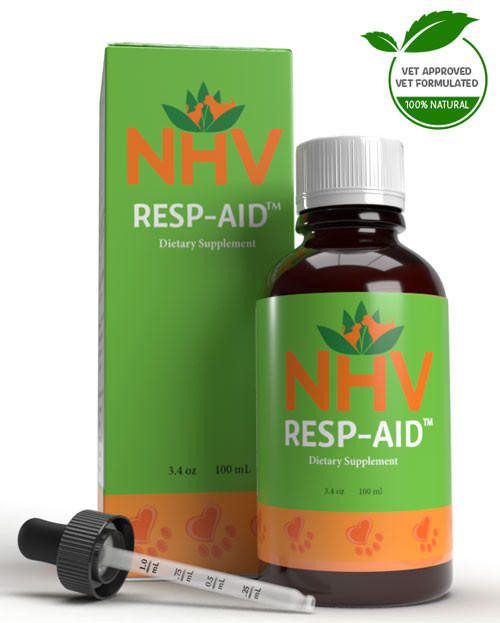
Vet-Formulated Remedy for Respiratory Infection in Dogs
buy 2 and save $3
3 month supply for a small to medium size
A 100% natural plant-based herbal remedy to help you dog fight infection and help relieve shortness of breath.
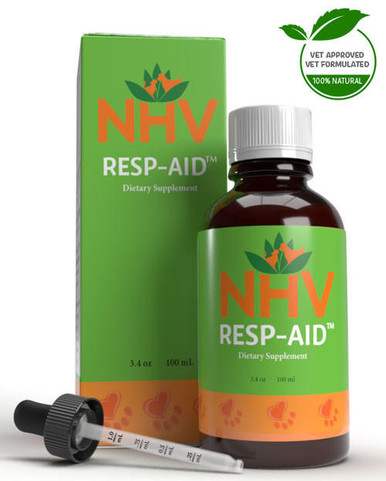
A 100% natural plant-based herbal remedy to help you dog fight infection and help relieve shortness of breath.
Dogs are susceptible to upper respiratory infections just like humans, and once infected, they can be highly contagious. Some breeds of dogs are more prone to getting respiratory infections, such as the Boston Terrier and Shih-Tzu. Find out if your dog breed is more prone to breathing difficulties and respiratory infections, and effective remedies for respiratory infection in dogs at NHV.
Symptoms of Respiratory Infections in Dogs
The symptoms are very similar to infection in humans.
Causes of Respiratory Infection in Dogs
Kennel cough is a common ailment among dogs that can be caused by a bacteria or viral infection.
NHV’s plant-based remedies can provide support along with vet-recommended treatment for respiratory infections in dogs. Read Bailee's tale of how NHV’s Resp-aid came to her rescue for allergic bronchitis.
You can read more about NHV Natural Pet Products and if you have questions about holistic supplements including our natural remedies for respiratory infections in dogs, ask an NHV expert, because, at NHV we want you and your canine companion to breathe easy naturally.
Your dog will breathe easier with NHV’s Resp-Aid, an all-natural plant-based formula containing these nine powerful herbs.
Beneficial Ingredients in NHV’s Natural Remedies for Respiratory Infections in Dogs
Select your pet's weight to determine the correct dose.
To be taken twice daily. Determine your pet’s weight and then use the easy chart below to determine the correct dose. This is the minimum dosage.
Pet's Weight Dosage
0 - 15 lb = 0.5 ml
16 - 30 lb = 1.0 ml
31 - 45 lb = 1.5 ml
46 - 60 lb = 2.0 ml
61 - 75 lb = 2.5 ml
Over 75 lb = 3.0 ml
How to Administer
Shake well before use. The easiest method is to use the dropper provide and places the drops into your pet’s food or favorite treat. You can also use the dropper and squirt directly into the pet’s mouth.
Some pets can be finicky, if this occurs consider hiding the drops in foods most pet’s love such as fish, chicken or yogurt or a favorite treat. If your pet only eats dry food then soak a few kibbles at feeding time.
For Best Results
Herbal dietary supplements are beneficial to the health and wellbeing of your pet and are safe for long-term use. Every pet responds to natural herbal supplements differently, therefore it is important to be consistent and administer the product daily. Supplements generally take two to four weeks to take effect, however this will vary from one animal to the next.
Product Storage
All NHV Natural Pet Products are pure herbal extracts and contain no artificial additives, preservatives or coloring. Shelf life after opening is 6 months and must be refrigerated after opening.
Cautions and Contraindications
Do not use in pregnant or nursing animals. Speak to your vet before using our products. A second visit is recommended if your pet’s condition does not improve, or deteriorates after continued use of the supplements.
All information provided by NHV Natural Pet Products is for educational purposes only.
Dogs are susceptible to upper respiratory infections just like humans, and once infected, they can be highly contagious. Some breeds of dogs are more prone to getting respiratory infections, such as the Boston Terrier and Shih-Tzu. Find out if your dog breed is more prone to breathing difficulties and respiratory infections, and effective remedies for respiratory infection in dogs at NHV.
Symptoms of Respiratory Infections in Dogs
The symptoms are very similar to infection in humans.
Causes of Respiratory Infection in Dogs
Kennel cough is a common ailment among dogs that can be caused by a bacteria or viral infection.
NHV’s plant-based remedies can provide support along with vet-recommended treatment for respiratory infections in dogs. Read Bailee's tale of how NHV’s Resp-aid came to her rescue for allergic bronchitis.
You can read more about NHV Natural Pet Products and if you have questions about holistic supplements including our natural remedies for respiratory infections in dogs, ask an NHV expert, because, at NHV we want you and your canine companion to breathe easy naturally.
Your dog will breathe easier with NHV’s Resp-Aid, an all-natural plant-based formula containing these nine powerful herbs.
Beneficial Ingredients in NHV’s Natural Remedies for Respiratory Infections in Dogs
Select your pet's weight to determine the correct dose.
To be taken twice daily. Determine your pet’s weight and then use the easy chart below to determine the correct dose. This is the minimum dosage.
Pet's Weight Dosage
0 - 15 lb = 0.5 ml
16 - 30 lb = 1.0 ml
31 - 45 lb = 1.5 ml
46 - 60 lb = 2.0 ml
61 - 75 lb = 2.5 ml
Over 75 lb = 3.0 ml
How to Administer
Shake well before use. The easiest method is to use the dropper provide and places the drops into your pet’s food or favorite treat. You can also use the dropper and squirt directly into the pet’s mouth.
Some pets can be finicky, if this occurs consider hiding the drops in foods most pet’s love such as fish, chicken or yogurt or a favorite treat. If your pet only eats dry food then soak a few kibbles at feeding time.
For Best Results
Herbal dietary supplements are beneficial to the health and wellbeing of your pet and are safe for long-term use. Every pet responds to natural herbal supplements differently, therefore it is important to be consistent and administer the product daily. Supplements generally take two to four weeks to take effect, however this will vary from one animal to the next.
Product Storage
All NHV Natural Pet Products are pure herbal extracts and contain no artificial additives, preservatives or coloring. Shelf life after opening is 6 months and must be refrigerated after opening.
Cautions and Contraindications
Do not use in pregnant or nursing animals. Speak to your vet before using our products. A second visit is recommended if your pet’s condition does not improve, or deteriorates after continued use of the supplements.
All information provided by NHV Natural Pet Products is for educational purposes only.
constipation support
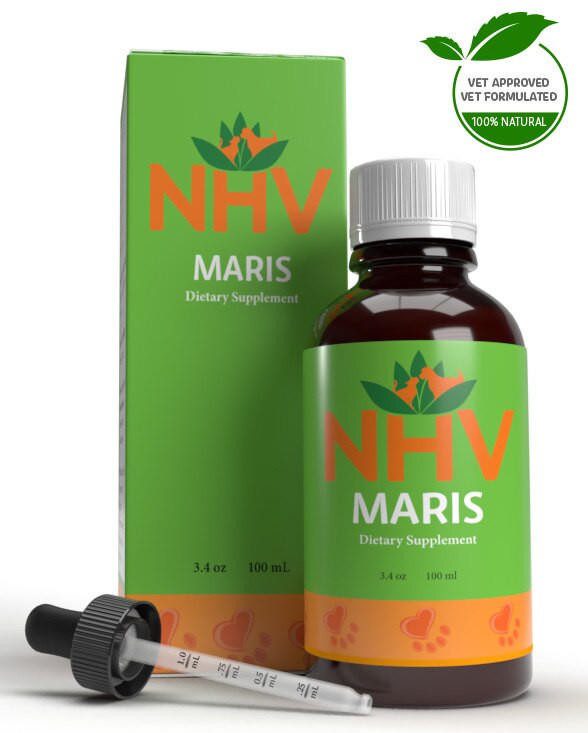
Natural Remedy for Cat Constipation
buy 2 and save $3
3 month supply for a small to medium size pet

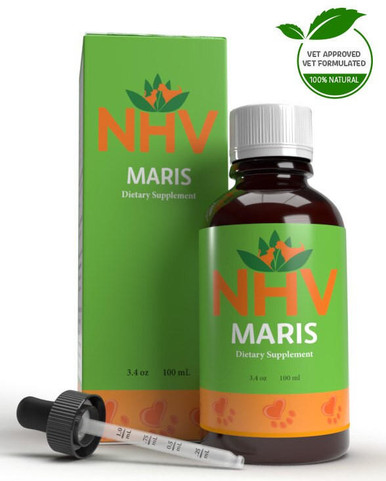

What to do for a cat with constipation? It can be a real messy situation, and long term constipation can cause serious health issues for your cat including megacolon in cats. You can help relieve your cat’s constipation with natural remedies formulated by vets. Promote healthy bowel movements with Maris, a gentle, herbal supplement that will soothe your pet’s intestines, soften stools, and help relieve cramps and gas.
Constipation occurs when a pet is unable to evacuate his or her bowels. When this occurs, water from fecal matter is absorbed by the colon, leaving a hard mass that is uncomfortable to pass.
Constipation may be caused by poor hydration or a dirty litter pan. Start by ensuring that your cat has easy access to clean drinking water and a clean litter box. Diet is another common factor. They may have ingested animal bones or other indigestible materials, like hair, certain plants, or litter.
Other possible causes may include:
Constipation may be a sign of a more serious condition, such as inflammation of the colon, called colitis. If your kitty’s constipation is recurring, it’s important to schedule a visit with your vet to rule this out.
Maris is an effective remedy to soothe the discomfort and symptoms of constipation naturally. Maris is a gentle herbal formula that can be used long term if your kitty suffers from constipation. For immediate, emergency relief of constipation please see your vet. All NHV supplements are ethically sourced or wildcrafted. They’re formulated by a holistic veterinarian to support your cat’s overall health. Have your cat try Maris and see the difference for yourself.
If your kitty is suffering from chronic constipation, ask your vet to show you how to palpate for constipation. This little trick along with supplements can save you a trip to the vet’s since it can help ease constipation before it gets too severe.
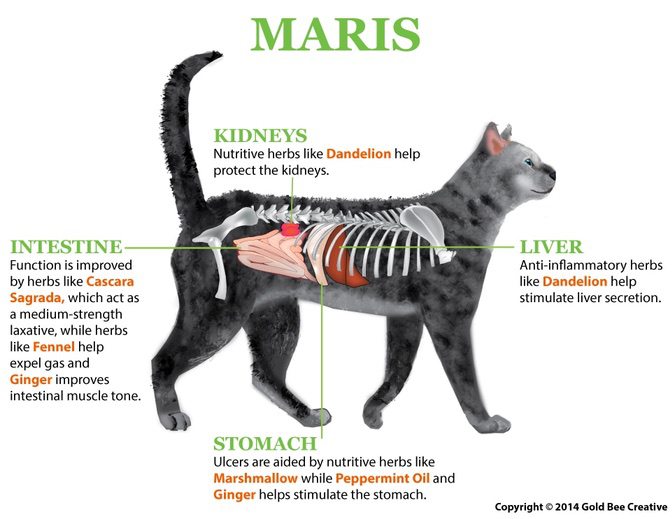
Cascara Sagrada – A medium-strength laxative that restores intestinal tone and muscle activity without cramping.
Marshmallow – Controls bacterial infection and soothes and softens irritated tissue. It has a soothing lubricating effect on the intestine.
Fennel – Relieves stomach cramps and reduces gas production.
Eleuthero – Reduces fatigue and leaves your pet feeling more energetic.
Dandelion – A vitamin-rich laxative that protects the liver and improves digestion. It also has anti-inflammatory properties.
Ginger – An antispasmodic and anti-flatulent that improves peristalsis and intestinal muscle tone.
Peppermint Oil – Relieves spasms, improves digestion, and helps your pet eliminate gas.
Select your pet's weight to determine the correct dose.
To be taken twice daily. Determine your pet’s weight and then use the easy chart below to determine the correct dose. This is the minimum dosage.
Pet's Weight Dosage
0 - 15 lb = 0.5 ml
16 - 30 lb = 1.0 ml
31 - 45 lb = 1.5 ml
46 - 60 lb = 2.0 ml
61 - 75 lb = 2.5 ml
Over 75 lb = 3.0 ml
How to Administer
Shake well before use. The easiest method is to use the dropper provide and places the drops into your pet’s food or favorite treat. You can also use the dropper and squirt directly into the pet’s mouth.
Some pets can be finicky, if this occurs consider hiding the drops in foods most pet’s love such as fish, chicken or yogurt or a favorite treat. If your pet only eats dry food then soak a few kibbles at feeding time.
For Best Results
Herbal dietary supplements are beneficial to the health and wellbeing of your pet and are safe for long-term use. Every pet responds to natural herbal supplements differently, therefore it is important to be consistent and administer the product daily. Supplements generally take two to four weeks to take effect, however this will vary from one animal to the next.
Product Storage
All NHV Natural Pet Products are pure herbal extracts and contain no artificial additives, preservatives or coloring. Shelf life after opening is 6 months and must be refrigerated after opening.
Cautions and Contraindications
Do not use Maris in pregnant or nursing animals. Do not use with intestinal obstructions. Speak to your vet before using our products. A second visit is recommended if your pet’s condition does not improve, or deteriorates after continued use of the supplements.
All information provided by NHV Natural Pet Products is for educational purposes only.
What to do for a cat with constipation? It can be a real messy situation, and long term constipation can cause serious health issues for your cat including megacolon in cats. You can help relieve your cat’s constipation with natural remedies formulated by vets. Promote healthy bowel movements with Maris, a gentle, herbal supplement that will soothe your pet’s intestines, soften stools, and help relieve cramps and gas.
Constipation occurs when a pet is unable to evacuate his or her bowels. When this occurs, water from fecal matter is absorbed by the colon, leaving a hard mass that is uncomfortable to pass.
Constipation may be caused by poor hydration or a dirty litter pan. Start by ensuring that your cat has easy access to clean drinking water and a clean litter box. Diet is another common factor. They may have ingested animal bones or other indigestible materials, like hair, certain plants, or litter.
Other possible causes may include:
Constipation may be a sign of a more serious condition, such as inflammation of the colon, called colitis. If your kitty’s constipation is recurring, it’s important to schedule a visit with your vet to rule this out.
Maris is an effective remedy to soothe the discomfort and symptoms of constipation naturally. Maris is a gentle herbal formula that can be used long term if your kitty suffers from constipation. For immediate, emergency relief of constipation please see your vet. All NHV supplements are ethically sourced or wildcrafted. They’re formulated by a holistic veterinarian to support your cat’s overall health. Have your cat try Maris and see the difference for yourself.
If your kitty is suffering from chronic constipation, ask your vet to show you how to palpate for constipation. This little trick along with supplements can save you a trip to the vet’s since it can help ease constipation before it gets too severe.

Cascara Sagrada – A medium-strength laxative that restores intestinal tone and muscle activity without cramping.
Marshmallow – Controls bacterial infection and soothes and softens irritated tissue. It has a soothing lubricating effect on the intestine.
Fennel – Relieves stomach cramps and reduces gas production.
Eleuthero – Reduces fatigue and leaves your pet feeling more energetic.
Dandelion – A vitamin-rich laxative that protects the liver and improves digestion. It also has anti-inflammatory properties.
Ginger – An antispasmodic and anti-flatulent that improves peristalsis and intestinal muscle tone.
Peppermint Oil – Relieves spasms, improves digestion, and helps your pet eliminate gas.
Select your pet's weight to determine the correct dose.
To be taken twice daily. Determine your pet’s weight and then use the easy chart below to determine the correct dose. This is the minimum dosage.
Pet's Weight Dosage
0 - 15 lb = 0.5 ml
16 - 30 lb = 1.0 ml
31 - 45 lb = 1.5 ml
46 - 60 lb = 2.0 ml
61 - 75 lb = 2.5 ml
Over 75 lb = 3.0 ml
How to Administer
Shake well before use. The easiest method is to use the dropper provide and places the drops into your pet’s food or favorite treat. You can also use the dropper and squirt directly into the pet’s mouth.
Some pets can be finicky, if this occurs consider hiding the drops in foods most pet’s love such as fish, chicken or yogurt or a favorite treat. If your pet only eats dry food then soak a few kibbles at feeding time.
For Best Results
Herbal dietary supplements are beneficial to the health and wellbeing of your pet and are safe for long-term use. Every pet responds to natural herbal supplements differently, therefore it is important to be consistent and administer the product daily. Supplements generally take two to four weeks to take effect, however this will vary from one animal to the next.
Product Storage
All NHV Natural Pet Products are pure herbal extracts and contain no artificial additives, preservatives or coloring. Shelf life after opening is 6 months and must be refrigerated after opening.
Cautions and Contraindications
Do not use Maris in pregnant or nursing animals. Do not use with intestinal obstructions. Speak to your vet before using our products. A second visit is recommended if your pet’s condition does not improve, or deteriorates after continued use of the supplements.
All information provided by NHV Natural Pet Products is for educational purposes only.
Published: March 10, 2022